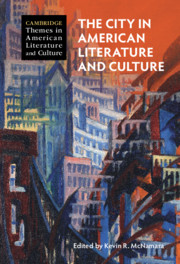Book contents
- The City in American Literature and Culture
- Cambridge Themes in American Literature and Culture
- The City in American Literature and Culture
- Copyright page
- Contents
- Illustrations
- Contributors
- Acknowledgments
- Introduction
- City Spaces
- City Lives
- Theory in the City
- Chapter 16 The Spatial Turn and Critical Race Studies
- Chapter 17 From Trauma Theory to Systemic Violence
- Chapter 18 Security Theory
- Chapter 19 Posthuman Cities
- Chapter 20 Critical Regionalism
- Coda City and Polis
- Further Reading
- Index
Chapter 19 - Posthuman Cities
from Theory in the City
Published online by Cambridge University Press: 06 August 2021
- The City in American Literature and Culture
- Cambridge Themes in American Literature and Culture
- The City in American Literature and Culture
- Copyright page
- Contents
- Illustrations
- Contributors
- Acknowledgments
- Introduction
- City Spaces
- City Lives
- Theory in the City
- Chapter 16 The Spatial Turn and Critical Race Studies
- Chapter 17 From Trauma Theory to Systemic Violence
- Chapter 18 Security Theory
- Chapter 19 Posthuman Cities
- Chapter 20 Critical Regionalism
- Coda City and Polis
- Further Reading
- Index
Summary
This chapter considers the idea of a posthuman city and its representation in American literature. Surveying posthumanism as a field of inquiry emerging from animal studies, which considers the blurring of species-based definitions of “human,” and cybernetics, which figures human agency as constituted by technological adjuncts, the chapter also traces the growing body of inquiry into urban life from these perspectives. Tracing the discourse of the smart city and earlier projects such as archologies and megastructures in experimental architecture, the chapter considers science fiction as a site for critiquing the social control nascent in smart cities by instead imagining intelligent cities. The chapter considers Ann Leckie’s Imperial Radch trilogy (Ancillary Justice (2013); Ancillary Sword (2014); Ancillary Mercy (2015)) as emblematic of this critique and as a model for imagining cities that embody emotional intelligence in addition to standard sensing practices more widely associated with smart cities. Leckie uses a truly posthuman city to challenge how human agency is figured in architecture and urban planning.
- Type
- Chapter
- Information
- The City in American Literature and Culture , pp. 312 - 330Publisher: Cambridge University PressPrint publication year: 2021

